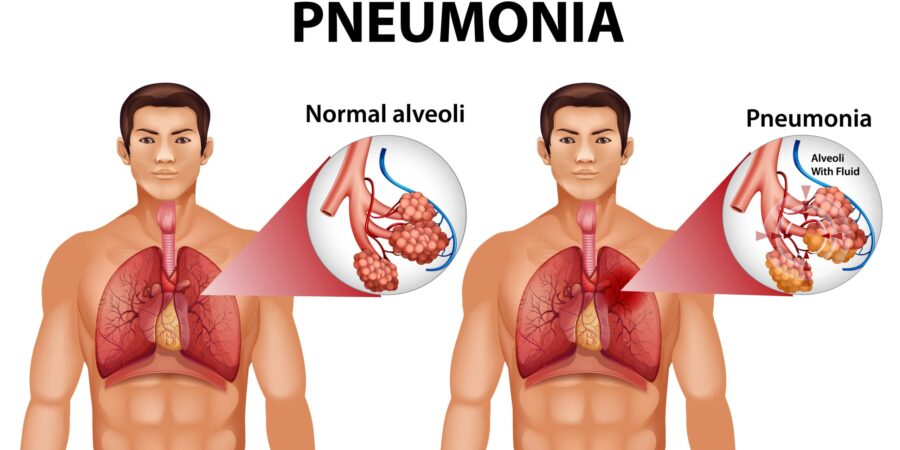Pneumonia
Pneumonia is an infection that inflames the air sacs in one or both lungs. The air sacs may fill with fluid or pus (purulent material), causing cough with phlegm or pus, fever, chills, and difficulty breathing. A variety of organisms, including bacteria, viruses and fungi, can cause pneumonia.
Pneumonia can range in seriousness from mild to life-threatening. It is most serious for infants and young children, people older than age 65, and people with health problems or weakened immune systems.
Symptoms
The signs and symptoms of pneumonia vary from mild to severe, depending on factors such as the type of germ causing the infection, and your age and overall health. Mild signs and symptoms often are similar to those of a cold or flu, but they last longer.
Signs and symptoms of pneumonia may include:
- Chest pain when you breathe or cough
- Confusion or changes in mental awareness (in adults age 65 and older)
- Cough, which may produce phlegm
- Fatigue
- Fever, sweating and shaking chills
- Lower than normal body temperature (in adults older than age 65 and people with weak immune systems)
- Nausea, vomiting or diarrhea
- Shortness of breath
Newborns and infants may not show any sign of the infection. Or they may vomit, have a fever and cough, appear restless or tired and without energy, or have difficulty breathing and eating.
When to see a doctor
See your doctor if you have difficulty breathing, chest pain, persistent fever of 102 F (39 C) or higher, or persistent cough, especially if you’re coughing up pus.
It’s especially important that people in these high-risk groups see a doctor:
- Adults older than age 65
- Children younger than age 2 with signs and symptoms
- People with an underlying health condition or weakened immune system
- People receiving chemotherapy or taking medication that suppresses the immune system
For some older adults and people with heart failure or chronic lung problems, pneumonia can quickly become a life-threatening condition.
Causes
Many germs can cause pneumonia. The most common are bacteria and viruses in the air we breathe. Your body usually prevents these germs from infecting your lungs. But sometimes these germs can overpower your immune system, even if your health is generally good.
Pneumonia is classified according to the types of germs that cause it and where you got the infection.
Community-acquired pneumonia
Community-acquired pneumonia is the most common type of pneumonia. It occurs outside of hospitals or other health care facilities. It may be caused by:
- The most common cause of bacterial pneumonia in the U.S. is Streptococcus pneumoniae. This type of pneumonia can occur on its own or after you’ve had a cold or the flu. It may affect one part (lobe) of the lung, a condition called lobar pneumonia.
- Bacteria-like organisms.Mycoplasma pneumoniae also can cause pneumonia. It typically produces milder symptoms than do other types of pneumonia. Walking pneumonia is an informal name given to this type of pneumonia, which typically isn’t severe enough to require bed rest.
- This type of pneumonia is most common in people with chronic health problems or weakened immune systems, and in people who have inhaled large doses of the organisms. The fungi that cause it can be found in soil or bird droppings and vary depending upon geographic location.
- Viruses, including COVID-19.Some of the viruses that cause colds and the flu can cause pneumonia. Viruses are the most common cause of pneumonia in children younger than 5 years. Viral pneumonia is usually mild. But in some cases it can become very serious. Coronavirus 2019 (COVID-19) may cause pneumonia, which can become severe.

FAQs
What are the facilities available at the clinic?
The following facilities are available:
- Pulmonary function testing (Spirometry)
- Bronchoscopy
- EBUS
- Sleep studies (polysomnography)
- Thoracoscopy
- Lung cancer chemotherapy
I snore. Do I need to undergo a sleep study test?
It is not necessary that all persons who snore need to undergo a sleep study. There should be associated features to label it a disease. You should seek consultation from a sleep specialist in this case, who will screen you appropriately.
What will happen to my body if I sleep less?
Sleep is one of the key factors that determine the health of an individual. How one wakes up in the morning is a fair indicator whether one is getting a proper sleep or not. Therefore, if you have been snoozing your alarm too often, you might be damaging your own health. Experts believe that under normal circumstances, one should be able to wake up refreshed. And if you are not then you might be suffering from a sleep disorder. This can cause neurological changes in your body and can reduce the productivity at work. Moreover, in the short run it can cause memory problems and severe hormonal changes in your body.
Whatv is Pulmonary sleep test?
PFT measures how much air you can breathe in and out and how fast you can do it and how well your lungs are working to deliver oxygen to your blood. PFT is a painless test and a technician will ask you to take a deep breath and then blow as hard as you can into a tube connected to PFT machine.
PFT is the most important test for the diagnosis and management of COPD. PFT is similar to ECG of the lungs